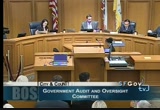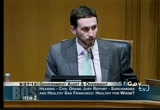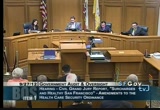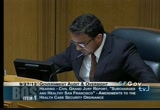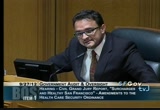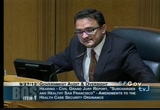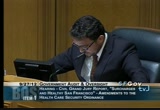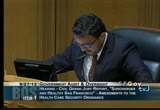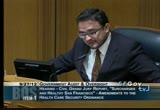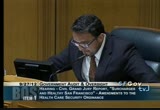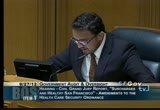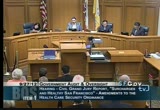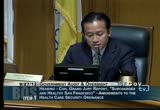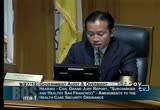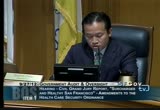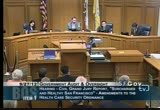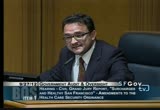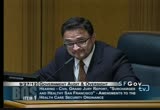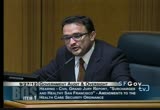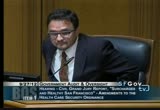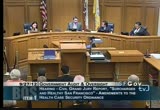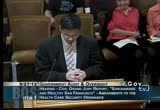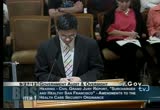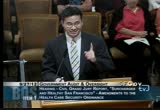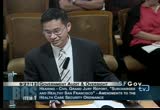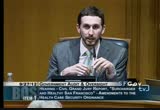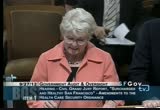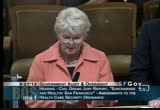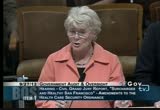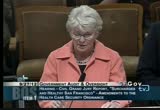tv [untitled] October 3, 2012 5:00am-5:30am PDT
5:00 am
order this meeting of the san francisco board of supervisors government audit oversight committee, i am supervisor scott wiener, i'm sitting in for supervisor mark farrell, to my right is supervisor carmen chu bho is sitting in for supervisor elsbernd, we're joined with supervisor compos, i would like to acknowledge and thank sfgtv staff for broadcasting today's hearing and our clerk is alisa miller, are there any announcements. er >> please shut off any cell phones, items upon the day will be ton october 16th board of
5:01 am
supervisors agenda, unless otherwise stated. er >> would you call items 1, 2 and 3. >> they're involving hearings involving the civil grand jury report, including health care security ordinance, addressed concerns raise ined the report and to provide the board of supervisor's to the reports finagled and recommendations. >> thank you very much, just to be clear, we are holding a hearing as required on the super grand jury report, in addition, supervisor compos called for a hearing on that report and then we have to prepare our responses so we're calling these together since they are on the same subject, and the way i would like to proceed is first i will have supervisor compos make some opening remarks and my other colleagues would would like to do so will maer from the civil grand jury and from the departments bho have responded, then we'll take public comment and then the committee will
5:02 am
prepare responses, so supervisor compos? >> thank you, mr. chairman, if i may, i want to note that my hearing requests was a broader discussion about the amendments that have been haed and the status of the ordinance, one report that aos related to that is the recent report from the labor and standards so we'd like to hear from them. >> so, we will maer from lsd, supervisor, compos? >> yes, good afternoon, mr. chairmen, members to have committee, i want to provide some context of how we got to this point, the health and security ordinance was introduced by my predecessor who's currently in the assembly and it was passed by a super majority of the san francisco board of supervisors in 2006. the health and security ordinance created what is known as the healthy san francisco program as well as an employer spending requirement for worker
5:03 am
health care. supervise or yam yan know at the time assumed he had written the ordinance so that all employers of the same size would have the same spending obligations as laid out in the law, and he and i have had many conversations where he's made it clear where that was always his understanding, and late 2010, several workers and their advocates came to my office to explain that in their view, employers had found and were exploiting a loophole in the health and security ordinance, a small number of businesses of employers were voiding the majority of their spending requirement by allocating money to what is known as a health reimbursement account. often, using these accounts to severely restrict the types of services that the accounts could be used for often providing no notice of the existence of the accounts to their workers and then reclaiming the majority of money allocated to those accounts at the end of the year.
5:04 am
we also discovered that many of these employers were profiting from the law by charging surcharges in the name of employee health care and then pocketing the majority of the money that was collected from consumers in san francisco. so, given that workers were not receiving the health care that we all intended them to receive, it was unfair that the vast majority of businesses and something else that we found out that in fact the vast majority of businesses are covered by the health and security ordinance in san francisco are doing the right thing and are following not only the letter but the spirit of the law. and so it was in response to these concerns that were raised to us by workers, by consumer advocates and a number of people in the community that we introduce legislation to close this loophole sx, the legislation that we introduced was a very simple reasonable
5:05 am
piece of legislation that said that when the health and security ordinance says that you have to spend money on health care, the word spend or expenditure means spend expenditure, means making an expenditure, not collecting money and not spending that, and that was really the very simple legislative solution that we tried to come up with that is a solution that recognized that most of this area is covered by federal law and that we as a city cannot get into the business of micro managing how business -- individual businesses manage these accounts because if we were to do that, we would be in violation of federal law. as you may recall, at the time that this was introduced, what we thought was a very simple piece of legislation turned out to be one of the most controversial pieces of legislation for that year, that legislation was approved by the
5:06 am
board of supervisors but much to our surprise and disappointment, the mayor vetoed that legislation in october of 2011 and then following that veto, there was an amendment that was introduced by the mayor work witching a number of my colleagues including president david chu here and supervisor mali ya cohen, and they introduced and passed a compromise version of the legislation that went into effect earlier this year in 2012, that legislation in my view and we believe that the reports from both the civil grand jury and the office of labor standards and enforcement will demonstrate this, that that compromised legislation that was passed and introduced well intended as it was in our estimation did not close the loop haom, it leaves the loophole within the health and security ordinance because it still allows employers as we
5:07 am
always said it would to place restrictions on how the money is used and even though the legislation requires that an employer collect surcharges that the money be spent on health care, the requirement doesn't do anything that is not already prohibited from and required by existing law. there are in the books consumer protection laws that make it clear that if you collect money from consumers for one purpose, you're supposed to spend it on that purpose, and yet as you will see in these reports, the issues that we identified in 2010 remain. subsequent to the passage of this compromised legislation, the civil grand jury as they will report shortly released a report entitled surcharges and health in san francisco healthy for bhom, the report details how 18 restaurants profited to the tune of over a million dollars by essentially in our view exploiting the good will
5:08 am
of san francisco restaurant patrons, consumers who had been willing to chip in and pay more when they go to restaurants so workers can be covered and provided with health care. the report found that a loophole also exists, that it's essentially creating a big problem for workers that continue to go uninsured here in san francisco. on august 23, 2012 just recently, the office of labor standards and enforcement released an additional report that analyzes the -- what happened in 2011 with respect to this issue, and the report as you will hear from the office of labor standards and enforcement is a very troubling report. it shows similar to the prior year in 2011, only 11 million of the 66 million dollars that were set aside for health care under reimbursement, under hrh,
5:09 am
only 11 of 66 million was actually reimbursed to employees for medical expenses, that means that only 17% of the amount that was supposed to go to health care actually went to health care which is in star contract to what happens under healthy san francisco where the city's reimbursement rate is 60%. the report also shows that over half of employers using hra's actually placed some restrictions on the use of those accounts. when we first introduced the legislation, one of the things we heard from folks who were oppose today legislation was the problem is not so much, you know, the accounts themselves but simply the fact that people don't know that they exist, and we recognize that that was an issue, but we always said that that's not the only issue, that it wasn't just that workers didn't know but even workers who knew they had access to these accounts, even if they had the knowledge, they could
5:10 am
not exercise their rights because restrictions were placed on how the money could be used, and these are some of the restrictions that were identified in this report, 30% of businesses actually do not allow employees to use hra's for health insurance. again, what the rational for not allowing workers to use that money for health insurance is, we're still trying to figure that out. we also found that 28% of employers did not allow, do not allow workers to use the amount -- use the money to enroll in healthy san francisco, and essentially what you find is that more than half, more than 50% of businesses are placing restrictions on how the money is used. of the 172 businesses that reported and posting surcharges on san francisco consumers,
5:11 am
172, 101 of them actually directed more money than they actually spent on health care. so, i look forward to the report. we believe that the facts speak for themselves and that the facts that are outlined in the report by the civil grand jury and by the office of labor standards and enforcement clearly show that we still have a loophole in san francisco. thank you, mr. chair. >> thank you, supervisor. president chu? >> thank you, mr. chair, and i want to thank supervisor compos for those opening remarks, i have just a couple of additional points that i would like to make. first of all, i want to thank the members of the community that brought this issue of this loophole to this board and i think it raised some important issues that we spent a lot of time tackling last year. the two main issues from my perspective that we needed to address were how we improve employee access to health care and how do we ensure that
5:12 am
consumers aren't deceived through misleading surcharges by businesses such as restaurants as alluded to by supervisor compos, after the debate we have and after mayor lee's veto of the initial legislation, i work witched supervisor cohen and our colleagues as well as many members of the community to move forward a series of amendments that i do think addresses this loophole and let me summarize them briefly, first of all, with regards to improving health access by improving benefit utilization rates, we passed a number of revision, to require quarterly notice requirements, how much they have and how much they can use them to require benefit packages to be designed to benefit employees so they can't be overly restricted which is something we heard, a very important provision of the amendments that we passed at the end of last year was to
5:13 am
extend the benefit to a two year rolling period to ensure access to funds even if those funds aren't used right away, and then last year, our amendments also extended the ability to utilize benefits for employees up to 90 days after the separation of the employee from his or her employer, with consumer fraud and misrepresentation, the surcharges being charged by restaurants, the amendments that we pass last year, if a business tells a consumer they are paying a fee for health care, the money collected that's required is to go to health care on an annual basis and those numbers would be tracked annually through a report file witched the city with the office of standard enforcement and the legislation clearly stated that cases of possible consumer fraud may be forward today the district attorney's office. now, i want to thank the members of the civil grand jury for the work they did, but just
5:14 am
point out one thing which is the data this report is based on was data that was obtained before the effective date of the amendments that we passed, the amendments we passed went into effect earlier this year on january 1, 2012, so all of the research, all of the good data that was pulled together really described the state of the situation which we addressed with the amendments we passed at the end of last year, from my perspective, i think it's a bit unfair to declare the amendments we passed at the end of last year that went into effect january 1, 2012 either a success or a failure and i have heard that utilization rates are improving this year in 2012 based ton work we've already done and it is my hope that these rates are going to continue to improve, from my perspective, if we do a similar study at the end of this year, next year, if we show different information, i will be willing to consider other changes but i think it's
5:15 am
premature for us to use data that simply confirmed the amendment that is we passed were meant to address, i wanted to open it up with those comments and i very much look forward to hear framing the various presentations today. >> thank you, president chew, and i recognize supervisor compos in a minute, i had the same exact reaction that president chu had wondering why this data was relevant as opposed to waiting a year and seeing how the new law was taking effect, so when the civil grand jury reports today, i'm really looking for an explanation of why this data predates the change in the law is relevant and why we didn't wait another year to get current data to do that, supervisor compos? >> thank you, mr. chairman and
5:16 am
i appreciate the perspective that has been outlined by my colleague, i will respectfully disagree, i think the data is relevant for a number of reasons but one of the reasons is that the amendment didn't do anything to address the issue of the restrictions that employers can actually place on the use of these accounts. nothing is going to change on that issue because of the amendment, so what we have here are two reports that separately and independently confirm the very point that was made when this amendment was passed, that you're not doing anything to prevent the undue placement of restrictions that go counter to public policy by these employers, so that is not going to change whether you look at it in two years, three years, the second point is on the issue of the surcharges which is the other big point, the mechanism that was created
5:17 am
basically says you're not supposed to spend money that you collect for health care, you're only supposed to spend it on health care and yet you really don't create a mechanism to ensure that that in fact is happening, the report that takes place is self-reporting, you are basically taking the word of the employer that first if they collect money, they tell you about it and if they tell you about it, that the information they've given you is actually accurate, and there are also no resources or mechanisms that lloc can use to verify that information. i would argue that in many respects, the amendment that i think that the facts at some point will bear this out, especially as this issue continues that in many respects, the event exacerbated the problem and made it worse because prior to the amendment, the law was silent on whether or not it was okay for an
5:18 am
employer to keep money and then after a period of time, if there was no use of that money, pocket that money. there was a question of whether or not that was even okay because the law was silent on that, but now the amendment makes it clear that it's okay, you have every legal right to take the money if after two years, the money has not been used so you have codify casing of a practice that you wanted to see businesses avoid, you have kaud fi casing of that practice by this amendment, so i do believe that the information that is before us is relevant and i look forward to the discussion. >> thank you very much, colleagues, are there any other introductory remarks? yes? >> i'd just like to read the statute so it's clear to everyone on this issue of the surcharge, it states if an employer imposes a surcharge to customers and..[reading]..
5:19 am
requirement, the covered employee should provide on lloc the amount collected during the 12 month reporting period for the surcharge spent on employee health care, every year, each employer has to provide the information of how much is being collected over to lloc, it's public information, it could be verified if employees would determine that's not the case, we'll know immediately whether an employer is deceiving the public or employees about that and it specifically says if the amount collected from the surcharge is greater tlan the amount spent on employee health care t employer must irrevocably pay or designate an amount equal to that difference for health care expenditures, in other words, if there's any discrepancy in the numbers, the employer has to kick in the amount that's the difference to cover health care and it states clearly, they may refer any potential cases of consumer fraud to appropriate authorities, we did
5:20 am
think about how we ensure that if there are restaurant that is are engaged in practices that none of us support that we have a mechanism to require every employer to show us what those numbers are which can be immediately verifiable and we can take action and i support action being staked by lloc, by the district attorney's office, by any consumer fraud in california. >> thank you very much, colleagues, any additional comments? with that, we will start with the civil grand jury to present its report. i'm not sure who's going be speaking for the civil grand jury. thank you. >> good afternoon, supervisors, thank you for holing this hearing on the 2011-2012 grand jury report health care security in san francisco, i am the person protemp of the [inaudible]. >> if you could speak up a little bit so that folks watching on tv can hear.
5:21 am
>> sure. i will try my best. before i turn the podium over to my colleagues who will be presenting the report, i wanted to acknowledge the presence of members of my jury, also present here today are members of past grand juries as well as some members of the current sitting grand jury and going to president chu's opening remarks, something that may be reviewed in a continuity report, i wanted to recognize absence of certain members of the 2011-2012 grand jury, they could not be here, that includes our foreperson, as well as mark buff fi, the chair of the committee that drafted and presented this report, as well as sharon you, a member of the investigative team, so i just wanted to echo the sentiments and the concerns
5:22 am
that supervisor campos had regarding this matter of concern, you know, every day, people in san francisco, people go to these restaurants and pay a surcharge that's tacked on to bills that businesses call mandates or compliance, and it was supposed to be meant to benefit those employees who did not otherwise have access to health care, however, based on the information, the jury acquired during its investigation, it's really unclear who's actually benefiting from healthy san francisco, and whether the policies and procedures in place adequately believe that situation and we actually believe not. just as an example, suspicious that's based on self-reported labor to the office of labor standards enforcement that some businesses collecting hundreds
5:23 am
of thousands of dollars from customers to benefit their employees did not reimburse a single penny for health care, while san francisco's concerned one of the healthiest cities in the u.s. and ranked from business week as the best city in the united states, you know, it's hard to believe that none of these particular employees had any health care expenses at all. >> that was in 2011, right? >> no, actually, two days ago, that's u.s. city -- >> no, no. >> that's every year, but in terms of data, 2011? >> yes. >> and this isn't criticism, you can't have data that doesn't exist yet in terms of the collection, but -- and maybe you want to go to one of your colleagues in terms of addressing given the change many the law, we know there was
5:24 am
a problem before and we can sgraoe or disagree whether the legislation that was passed and signed was the best or not the best way that he we had a disagreement on the board, we can agree there was a change? >> we agree, and so based on your response then and based on what's going forward, i'd like to turn the podium over to my colleagues, kay evans and matthew could cohen to address the issue. >> just one second, i think the reason i'm bringing this up is -- and i don't want to speak for president chu, we're coming from a similar place, i have great respect for the civil
5:25 am
grand jury and i know a lot of people served on it and it's important work and people work an enormous amount of effort into this and as a result when reports get released, the press focuses on them, it gets a lot of attention as it should because it's important work and the civil grand jury's done good work over the years, and so, you know, as a result, i should think it's important always to know what the data was and what the limitations are and so it's good that we're having this dialog but i just wanted it to be very clear what this is, with that said, thank you. >> good afternoon, supervisors, in 2008, the city and county of san francisco initiated its historical universal health care program for all rez dens of san francisco, the san francisco civil grand jury thinks our city should be commended for enacting this ambitious and inclusive
5:26 am
legislation for the delivery of health care to the uninsured. while healthy workers are important in all businesses, healthy workers are vital in our city's restaurants to prevent the spread of communicable disease, none of us want to contemplate that the people cooking and serving our meals could be onerously ill and carrying a terrible disease. unfortunately, there is a compelling financial incentive for many businesses to overlook or turn a blind eye to these unsettling issues. it is for this reason that the 2011-12 san francisco civil grand jury decided to look into this and how this came to be. we wanted to know what happens to the surcharge for healthy san francisco that is added to the customer's bill? where does the money go? health reimbursement account guidelines, we want them to be
5:27 am
uniform among employers, are they? how much of the employee spending requirement is actually spent on employee health care? is profiting from h*ement care surcharge a form of consumer fraud? the san francisco legislature mandates that most san francisco employers spend a minimum dollar amount per employee on health care. this program provides direct health care to the uninsured by utilizing existing health clinics, government hospitals, partnerships with local health care providers, there are several options as to the method of compliance with the employee spending requirement, in hra, health reimbursement account where employers earmark the funds and pay out only when actual medical costs are incurred by their employee, furthermore, after two years or 90 days after the employee's termination, employers can
5:28 am
retain any unused funds for their own use. the city option where the city contracts with a third party specializing in health care spending accounts to administer the employee's medical reimbursement account and the funds remain available to the employee for life unless there has been a period of inactivity for 18 months, in that case, the city reclaims the unused funds. the last option is privately paid insurance plans, the office of labor standards enforcement reported in 2010 that 860 out of 4 thousand employers used the hra option. the total amount allocated to the employees were 62.5 million dollars. only 12.4 million dollars, however, was actually spent on employee medical care allowing their employers to reclaim or
5:29 am
retain up to 50.1 million dollars or 80% of their required expenditures. this discrepancy is disturbing and clearly indicates to the jury that employees are not receiving the full benefit of health care funds intended by the health care security ordinance. our investigation found that a small but definitely growing segment of employers primarily in the restaurant industry but not exclusive to it are profiting from the practice of adding a surcharge to the bill of every customer. by using private reimbursement plans instead of the city's medical reimbursement account, these same employers are legally able to reclaim the ma jart amount of funds intended for employee health care, thus, increasing their profits even more. the jury feels that the blatant capture of funds is at
177 Views
IN COLLECTIONS
SFGTV: San Francisco Government Television Television Archive
Television Archive  Television Archive News Search Service
Television Archive News Search Service 
Uploaded by TV Archive on

 Live Music Archive
Live Music Archive Librivox Free Audio
Librivox Free Audio Metropolitan Museum
Metropolitan Museum Cleveland Museum of Art
Cleveland Museum of Art Internet Arcade
Internet Arcade Console Living Room
Console Living Room Books to Borrow
Books to Borrow Open Library
Open Library TV News
TV News Understanding 9/11
Understanding 9/11